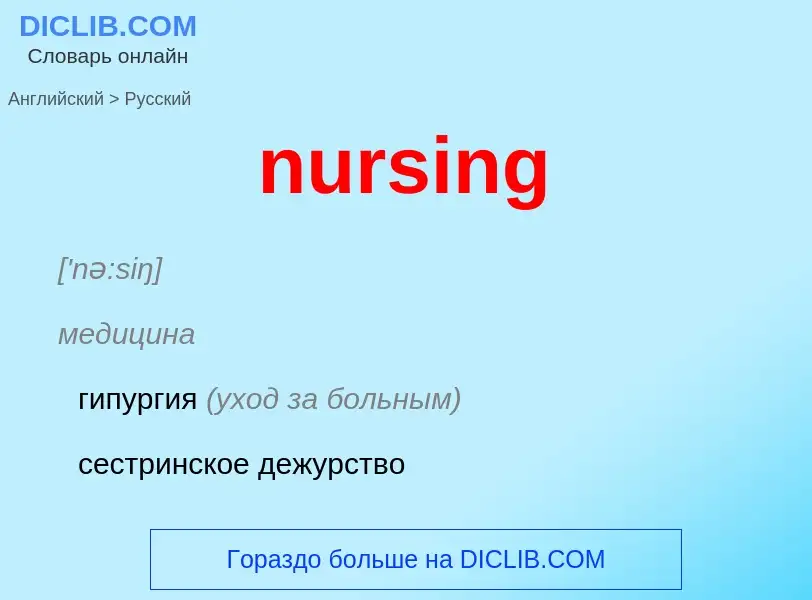Übersetzung und Analyse von Wörtern durch künstliche Intelligenz ChatGPT
Auf dieser Seite erhalten Sie eine detaillierte Analyse eines Wortes oder einer Phrase mithilfe der besten heute verfügbaren Technologie der künstlichen Intelligenz:
- wie das Wort verwendet wird
- Häufigkeit der Nutzung
- es wird häufiger in mündlicher oder schriftlicher Rede verwendet
- Wortübersetzungsoptionen
- Anwendungsbeispiele (mehrere Phrasen mit Übersetzung)
- Etymologie
nursing - Übersetzung nach russisch
['nə:siŋ]
медицина
гипургия (уход за больным)
сестринское дежурство
сестринское обслуживание
уход за больным
прилагательное
общая лексика
связанный с уходом за больным и т. п.
кормящая (о женщине)
грудной (о ребёнке)
существительное
['nə:siŋ]
общая лексика
уход (за больным и т. п.)
профессия среднего медицинского персонала
кормление грудью и пр.
[nə:s]
общая лексика
кормить
выкармливать
выращивать
песчаная акула (Odontaspis)
вынянчивать
медицина
медсестра
медицинская сестра
сестра (медицинская)
средний медицинский работник
Смотрите также
существительное
[nə:s]
общая лексика
няня
нянька
кормилица
мамка
сиделка
санитарка
медицинская сестра
хранитель (традиций и т. п.)
колыбель (свободы и т. п.)
нянченье
пестование
дерево
дающее защиту другому
самка-кормилица у муравьёв
няня, нянька
кормилица, мамка
нянченье, пестование
дерево, посаженное для того, чтобы дать тень другим деревьям
рабочий муравей
гренландская или вест-индская акула
энтомология
пчела-кормилица
в переносном значении
колыбель
зоология
рабочая пчела
глагол
общая лексика
кормить грудью
выкармливать ребёнка
быть кормилицей
сосать
брать грудь (о ребёнке)
пить медленно
посасывать
пригубливать
нянчить
ухаживать за детьми
быть няней
ухаживать
обхаживать
ухаживать за больным(и)
быть медицинской сестрой или фельдшерицей
быть сиделкой
бережно обращаться
лечить
выращивать
холить (растение и т. п.)
(in) воспитывать (в определённых условиях)
лелеять
питать
таить
поощрять
развивать
растить
держать в объятиях
на коленях
нежно прижимать к груди
кормить, выкармливать (ребенка)
питать, таить (злобу)
стараться задобрить
экономно хозяйничать
беречь
ласкать
сленг
ехать следом
неотступно следовать (особ. об автобусах конкурирующих компаний)
теснить
синоним
антоним
Definition
Wikipedia

Nursing is a profession within the healthcare sector focused on the care of individuals, families, and communities so they may attain, maintain, or recover optimal health and quality of life. Nurses may be differentiated from other healthcare providers by their approach to patient care, training, and scope of practice. Nurses practice in many specialties with differing levels of prescription authority. Nurses comprise the largest component of most healthcare environments; but there is evidence of international shortages of qualified nurses. Nurses collaborate with other healthcare providers such as physicians, nurse practitioners, physical therapists, and psychologists. Unlike nurse practitioners, nurses typically cannot prescribe medications in the US. Nurse practitioners are nurses with a graduate degree in advanced practice nursing. They practice independently in a variety of settings in more than half of the United States. Since the postwar period, nurse education has undergone a process of diversification towards advanced and specialized credentials, and many of the traditional regulations and provider roles are changing.
Nurses develop a plan of care, working collaboratively with physicians, therapists, the patient, the patient's family, and other team members that focuses on treating illness to improve quality of life. In the United Kingdom and the United States, clinical nurse specialists and nurse practitioners, diagnose health problems and prescribe the correct medications and other therapies, depending on particular state regulations. Nurses may help coordinate the patient care performed by other members of a multidisciplinary health care team such as therapists, medical practitioners, and dietitians. Nurses provide care both interdependently, for example, with physicians, and independently as nursing professionals. In addition to providing care and support, nurses educate the public and promote health and wellness.


.jpg?width=200)


![A recruiting poster for Australian nurses from [[World War I]] A recruiting poster for Australian nurses from [[World War I]]](https://commons.wikimedia.org/wiki/Special:FilePath/RedCrossNursen.jpg?width=200)

